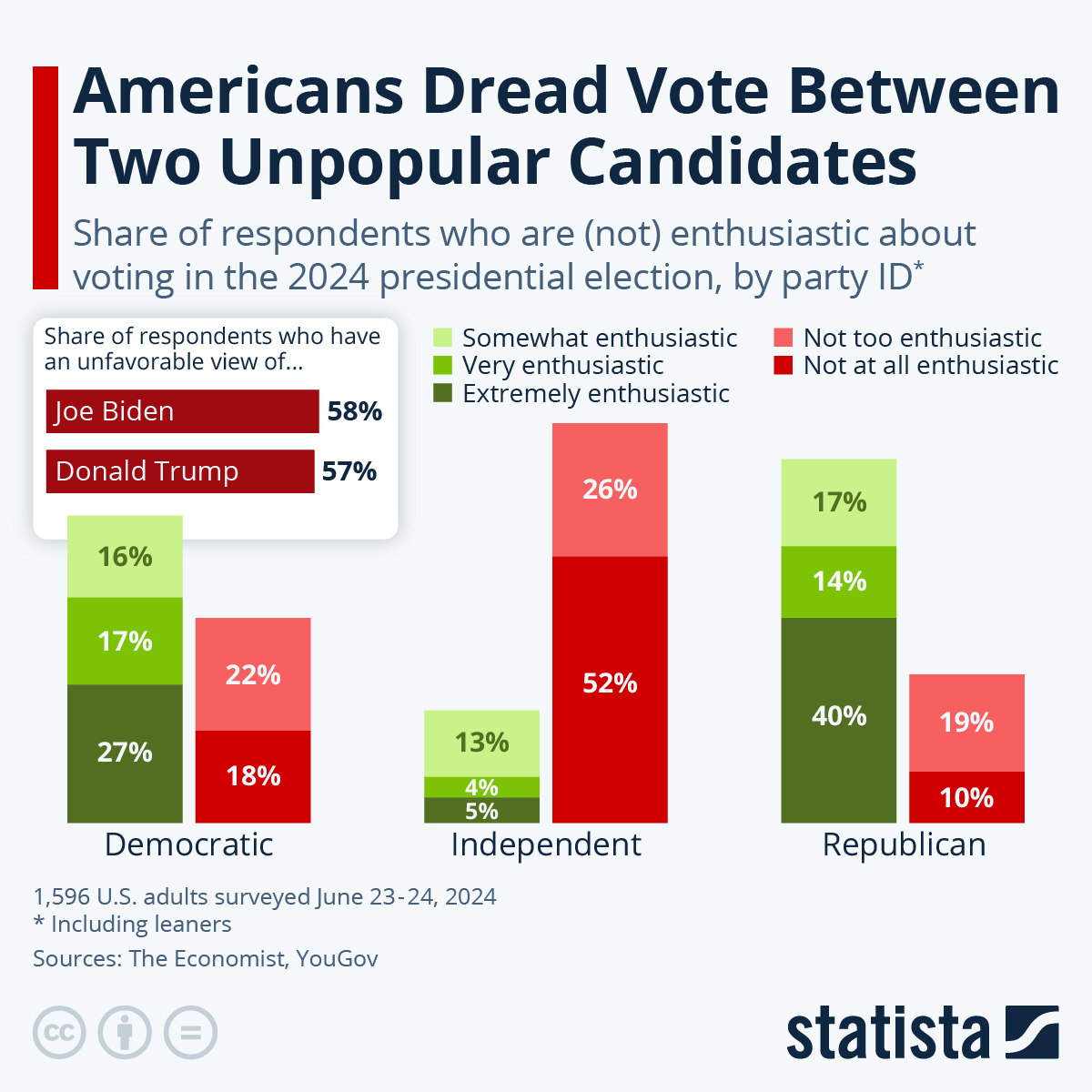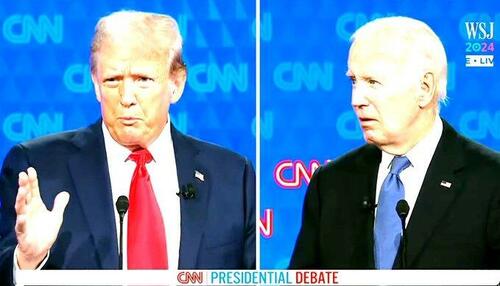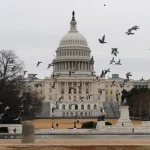
When President Joe Biden and his predecessor and presumptive challenger Donald Trump faced off in the first of two planned presidential debates in Atlanta, Georgia on Thursday night, things were very different from usual.
First of all, it was the earliest date ever for a presidential debate, which are usually held in September and October, shortly ahead of the election and after the candidates have officially been nominated by their parties. Secondly, the debate was hosted by CNN and held without a live audience, bypassing the Commission on Presidential Debates, which had organized all such events since 1988.
Additionally, as Statista's Felix Richter notes, the debate was also unique in that it featured two candidates that are viewed as unfit for the job by large parts of the American public, albeit for very different reasons. While President Biden is widely viewed as too old for a second term (and apparently proved that view correct last night), former President Trump is the first convicted felon to run for the country’s highest office.
As a result of this unusual match-up, many voters feel like they’re caught between a rock and a hard place, as they have serious reservations about both candidates.
According to a recent poll by The Economist and YouGov, Biden and Trump are seen unfavorably by almost 60 percent of Americans, with a shocking 44 and 47 percent holding very unfavorable views of the incumbent and his challenger, respectively.
Of course, those numbers are largely driven by the extreme polarization of today’s political landscape, resulting in 92 percent of likely Democratic voters seeing Trump unfavorably and 94 percent of likely Republican voters holding a negative view of Biden, but there are reservations about their own candidate on both sides of the political spectrum as well.
You will find more infographics at Statista
As Statista's chart above shows, this results in what is often described as “election dread” or a widespread lack of enthusiasm ahead of the 2024 presidential election.
According to The Economist/YouGov, 44 of percent of the 1,600 U.S. adults surveyed are not or not at all enthusiastic about voting in November, with election dread most widespread among those who identified as Independent – at 78 percent.
Unsurprisingly, those who identify with or lean towards the Republican party are more enthusiastic about the upcoming vote, as concerns about Biden’s age appear to be more widespread within the Democratic base than doubts about Trump’s fitness for office are among Republicans.
We will see if these numbers tilt aggressively in favor of Trump in the following days after Biden's performance last night.
When President Joe Biden and his predecessor and presumptive challenger Donald Trump faced off in the first of two planned presidential debates in Atlanta, Georgia on Thursday night, things were very different from usual.
First of all, it was the earliest date ever for a presidential debate, which are usually held in September and October, shortly ahead of the election and after the candidates have officially been nominated by their parties. Secondly, the debate was hosted by CNN and held without a live audience, bypassing the Commission on Presidential Debates, which had organized all such events since 1988.
Additionally, as Statista’s Felix Richter notes, the debate was also unique in that it featured two candidates that are viewed as unfit for the job by large parts of the American public, albeit for very different reasons. While President Biden is widely viewed as too old for a second term (and apparently proved that view correct last night), former President Trump is the first convicted felon to run for the country’s highest office.
As a result of this unusual match-up, many voters feel like they’re caught between a rock and a hard place, as they have serious reservations about both candidates.
According to a recent poll by The Economist and YouGov, Biden and Trump are seen unfavorably by almost 60 percent of Americans, with a shocking 44 and 47 percent holding very unfavorable views of the incumbent and his challenger, respectively.
Of course, those numbers are largely driven by the extreme polarization of today’s political landscape, resulting in 92 percent of likely Democratic voters seeing Trump unfavorably and 94 percent of likely Republican voters holding a negative view of Biden, but there are reservations about their own candidate on both sides of the political spectrum as well.
You will find more infographics at Statista
As Statista’s chart above shows, this results in what is often described as “election dread” or a widespread lack of enthusiasm ahead of the 2024 presidential election.
According to The Economist/YouGov, 44 of percent of the 1,600 U.S. adults surveyed are not or not at all enthusiastic about voting in November, with election dread most widespread among those who identified as Independent – at 78 percent.
Unsurprisingly, those who identify with or lean towards the Republican party are more enthusiastic about the upcoming vote, as concerns about Biden’s age appear to be more widespread within the Democratic base than doubts about Trump’s fitness for office are among Republicans.
We will see if these numbers tilt aggressively in favor of Trump in the following days after Biden’s performance last night.
Loading…






